92 F. high in the Twin Cities Wednesday.
73 F. peak dew point yesterday in the cities.
57 F. predicted dew point by 7 am Friday morning.
24 days at or above 90 F. so far in 2012.
83 F. average high for July 25.
89 F. high on July 25, 2011.
+7.4 F. The first 24 days of July averaged 7.4 F. warmer than average in the metro area.
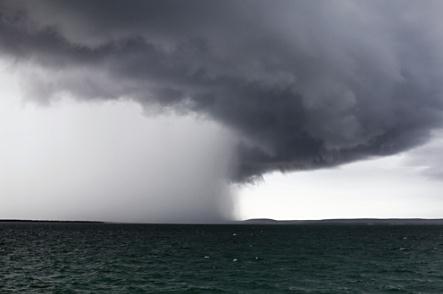 4.38"
4.38" rain so far in July at KMSP, 1.16" wetter than average, to date.
.08"
rain forecast late this afternoon and evening from instability showers,
possible thunder. Dry weather prevails Friday, probably Saturday as
well.
 Trending (Slightly) Cooler.
Trending (Slightly) Cooler.
You'll notice a welcome dip in temperature and dew point today into
Saturday morning, but the ECMWF model brings more 90s into town the
first half of next week - followed by a much more significant puff of
Canadian air by next Friday (highs in the low 70s?) Yes, that would be
nice.
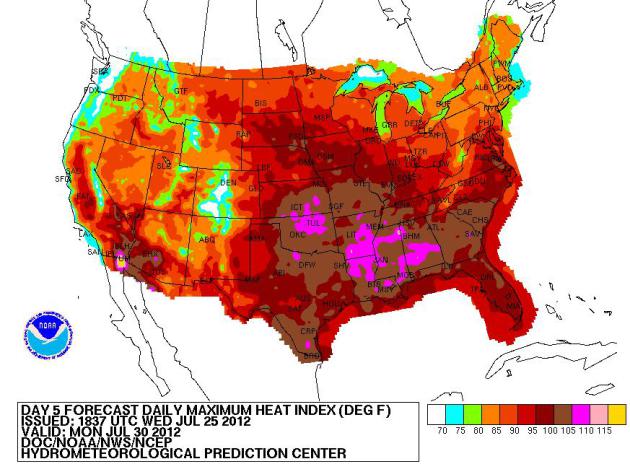 Predicted Heat Index Next Monday
Predicted Heat Index Next Monday.
The worst of the heat and humidity is forecast to shift into the
southern Plains and Mid South by early next week - heat indices near 110
from Oklahoma City to Little Rock and Montgomery, Alabama. Source:
NOAA.
"
Ed Hopkins, assistant state climatologist in Madison, said the
drought could be the worst "going back to the 1930s." As of Monday, more
than half the state remained "abnormally dry" or worse. Three-fourths
of the state's farmland was "short" or "very short" of moisture,
according to the state's weekly crop report." - excerpt of a Star
Tribune story on the extreme drought gripping much of central and
southern Wisconsin - details below. Photo: Elizabeth Flores, Star
Tribune.
"
Over the past 20 years, the intensity forecasts have shown
essentially no improvement," Knabb said. "We're routinely off by a
category on the intensity forecasts on the Saffir–Simpson Hurricane
Wind Scale." - from a story at the Sun Sentinel; details below. Photo: thecarconnection.com.
150 gigatons of ice loss observed every year in Greenland in recent decades. NASA, via PBS Newshour.
“
It’s pretty safe to say that what we’re seeing here is the
warmest that we’ve seen in Lake Superior in a century,” said Jay
Austin, a professor at the University of Minnesota at Duluth, who has
researched the lake’s water temperatures back to the beginning of the
20th century." - excerpt of a story from Climate Central; details below. Image above: NASA.
"
Gardiner tells us that Robert Gifford, a psychologist at the
University of Victoria in British Columbia thinks we have difficulty
"imagining a future drastically different from the present. We block
out complex problems that lack simple solutions. We dislike delayed
benefits and so are reluctant to sacrifice today for future gains. And
we find it harder to confront problems that creep up on us than
emergencies that hit quickly." - from a Doug Craig post at redding.com; details below.
"
Scientists estimate that if all of Greenland's ice sheet were to
melt, the global sea level would rise by 23 feet (7 meters). "To be
perfectly clear, that is not what we're seeing," Mote said. "Greenland
is losing mass, but it would take a very long time to lose all of that
mass." - excerpt from a National Geographic article below.
"
A study published in 2009 found
that rather than a 1-to-1 ratio, as would be expected if the climate
were not warming, the ratio has been closer to 2-to-1 in favor of warm
temperature records during the past decade (2000-2009). This finding
cannot be explained by natural climate variability alone, the study
found, and is instead consistent with global warming." - details from Climate Central below.
U.S. Drought Monitor. Here's an interactive map, courtesy of
The Star Tribune and NOAA's Drought Monitor: "
The
map (above) is based on data released each Thursday at 8:30 a.m.
Eastern Time. The drought monitor combines numeric measures of drought
and experts' best judgment into a weekly map. It is produced by the
NDMC, the U.S. Department of Agriculture and the National Oceanic and
Atmospheric Administration and incorporates review from 300
climatologists, extension agents and others across the nation. Each week
the previous map is revised based on rain, snow and other events,
observers' reports of how drought is affecting crops, wildlife and other
indicators."
Extreme Heat Proves Relentless In Central States. A few jaw-dropping details from
Climate Central: "...
During
the July 17-to-23 period, 866 daily high temperature records were set
or tied across the country, along with 716 warm overnight low
temperature records. Of these, 14 of the high temperature records were
monthly records, and eight were all-time high temperature records. So
far this year, warm temperature records have been outpacing cold records
by a ratio of about 7-to-1. The ratio is even more lopsided, at closer
to 9-to-1, when looking only at record daily highs compared to record
daily lows. (Track record-breaking temperatures using Climate Central's Record Tracker.)"
Map credit above: "
High temperature forecast for Tuesday,
July 24, showing the area of extreme heat in the central states. Click
on the image for a larger version." Credit: NOAA.
Withering Drought Choking Wisconsin. Details from
The Star Tribune; here's an excerpt: "
COCHRANE,
WIS. -- Rain finally fell on Wisconsin's bluff country this week, but
for much of the corn on Keith Greshik's 900-acre farm, it was too
little too late. Stalks that should be lush, green and 10 feet tall are
brown and crisp and barely as high as the bill on Greshik's cap. Fields
that only a month ago held potential for substantial yields are now
nearly a total loss, withered by five weeks of stifling heat and dry
weather the likes of which southwestern Wisconsin hasn't seen in
decades. "This stuff isn't going to amount to anything," a discouraged
Greshik, 43, said the other day as he inspected his battered corn. "It's
done."
Photo credit above: "
It’s kind of a crap shoot, and it’s
part of farming,” said Keith Greshik, a grain farmer near Cochrane,
Wis. “You don’t get to do well every year.”
Rainfall Since April 1. Talk about some wild
variations: 24" from near Duluth to Crosslake and Brainerd, closer to
18" in the Twin Cities metro, but 8" over far southeastern Minnesota -
closer to 5" for portions of the Red River Valley. Map courtesy of the
Minnesota DNR and the
Minnesota Climatology Working Group.
Rainfall Departure From Normal Since April 1. Much
of eastern Minnesota is running a rainfall surplus during the growing
season, as much as 12" wetter than average from near Crosby and Aitkin
to Duluth - while portions of southeastern Minnesota are 4" drier than
average, to date - as much as 6" drier over northwestern Minnesota.
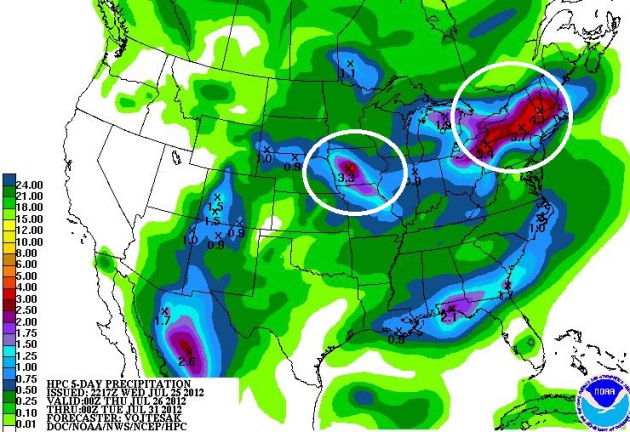 Drought-Denting Rains?
Drought-Denting Rains? The
5-Day NOAA HPC rainfall prediction prints out some 3" amounts over
Iowa, providing some potential (minor) relief for portions of the Corn
Belt. But little rain is predicted for the Great Plains. Some 2-4"
amounts are expected over New England by next Tuesday.
Great Lakes Water Temperatures At Record Levels. Here's an excerpt of an interesting story at
Climate Central: "
Looking
to escape to the beach this summer? Well, before you book that trip to
Cape Cod or the Outer Banks of North Carolina, you might want to
consider an unorthodox option — the shores of Lake Superior. The lake,
which is the northernmost, coldest, and deepest of the five Great Lakes,
is the warmest it has been at this time of year in at least a century,
thanks to the mild winter, warm spring, and hot, dry summer."
Graphic credit above: "
A comparison between Lake
Superior's average water temperature this year so far and the
longer-term average. Click on the image for a larger version." Credit: GLERL.
Suddenly Baking Britain Weathers More Pre-Olympic Woes. From rain, wind and chill to frying heat - London has seen it all in recent weeks; here's an excerpt from the
L.A. Times: "
For
weeks, forecasters warned that the upcoming Olympics could be beset by
rain, and organizers worried that some events at the Summer Games
could be washed out after London had its wettest April and June on
record. On Tuesday, railway officials warned that some trains would not
stop at the Olympic Park in East London because of extreme weather,
causing travel headaches. But this time there was another reason: It’s
too hot. The gloomy aspect of the last few months suddenly gave way this
week to glorious blue skies and temperatures in the 80s, a level many
Londoners had forgotten was possible."
Photo credit above: The Los Angeles Times.
European Weather. For a quick look at weather for
the Olympic Games, including day-by-day rainfall predictions and
forecast highs looking out 7 days (and a detailed 15 day extended
outlook for London)
click here - data and maps courtesy of Ham Weather.
Olympic-Size Cooing Trend. After peaking in the low
90s yesterday, temperatures are forecast to fall into the mid to upper
70s by Friday, low 70s over the weekend - much better for athletes (and
fans). More details from the U.K. Met Office
here.
 London Outlook
London Outlook. Here's one more prediction:
raw ECMWF
model
data for London through the end of next week, showing highs in the mid
60s to low 70s, a few weekend showers, maybe some heavier rain by the
end of next week.
UK Weather. Here is the best high-resolution satellite imagery I've found (for free) online - courtesy of
sat24.com.
20 Years After Hurricane Andrew Hit Miami-Dade, Track Forecasting Has Made Giant Strides.
The Orlando Sun Sentinel
has a story focused on big improvements in hurricane prediction,
especially future track. Predicting future hurricane intensity is still
problematic (the models don't handle this nearly as well). Here's an
excerpt: "
Since Andrew there has been a dramatic improvement in the
accuracy of the track forecast," said Rick Knabb, director of the
National Hurricane Center. "That's a testament to the improvement in
the models, the increase in satellite data that gives us a better
handle on the forecast of steering currents." Forecasters have also
improved their predictions of storm surge, the violent, wind-driven
increase in local sea level that's considered one of the most deadly
elements of a hurricane. But they agree they need to do a better job of
getting word out. "We are in desperate need of a storm surge warning,"
Knabb said. "Storm surge is the one weather-related hazard that has
the potential of taking more lives in a single day than any other."
Hurricane Forecasters: Despite Advances, Florida Still Vulnerable To Next Big One.
Here's another information-rich article, focused on new technology
implemented since Hurricane Andrew devastated the Miami suburbs. Here's
an excerpt from
The Miami Herald: "....
Though
they had done a good job of predicting Andrew’s path, the hurricane’s
rapid intensification as it crossed the Bahamas caught scientists, and
the public, by surprise. The shock of the storm sparked a surge in
hurricane research that has reduced track errors by more than half
since Andrew — to less than 100 miles, 48 hours out. “What has happened
since Andrew is stunning,” said Frank Marks, director of NOAA’s
hurricane research division on Virginia Key. Far more satellite images
and data are available — though some of the aging space gear is in need
of replacement. Aboard Hurricane Hunter planes, innovations like
Doppler radar and a device called a stepped frequency microwave
radiometer that estimates wind speed based on readings of whipped-up
sea foam have given researchers better data and understanding of a
storm’s inner structure."
Read more here: http://www.miamiherald.com/2012/07/24/2910272/hurricane-forecasters-despite.html#storylink=cpy
"Ask Paul". Weather-related Q&A:
"
The Strib shows that precipitation is 6.86" above average for
the year and 1.29" above average for the month in the Twin Cities
(airport?). How do you define a drought? Thanks."
Ed Morsman
Ed - fair question. The immediate metro is not in a drought, at least
not technically. Far western suburbs are drying out, and much of
southern and western Minnesota, including the Red River Valley, is in a
moderate drought. As of late last week nearly 34% of Minnesota was in a
moderate drought, up from 24% the week before.
All weather, like politics, is local, right? "Paul said there was a
drought, but we've seen plenty of rain at my house." The metro has seen
considerably more rain than far southern and western counties, the corn
and bean belt, where farmers are very worried about drought conditions.
Even though most of our readers live in or near the Twin Cities, I try
very hard to keep a Minnesota-centric view in the blog, and that means
including information that's relevant to people from Rochester and
Mankato to Brainerd, Duluth and Moorhead. No small task.
* Drought Monitor map above can be viewed here. The latest Drought
Monitor is due by Friday - based on recent rains I expect some
improvement in the drought, especially over southern Minnesota.
_____________________________________________________________________
Hi Paul,
"
Why do you and 75% of the population in the Midwest complain so
much about the heat, and "look for the light at the end of the tunnel"
for this heat to end? We will have a lot of months where it will simply
be cold with no chance of it being even lukewarm. It seems most people
here in Minnesota aren't happy when it's cold or hot, so those people
are happy about 4 days out of the 365 day year. Living here my entire
life I have learned to embrace both extremes My favorite weather is 90
and humid, and my second favorite is 25 with snow falling from the sky.
Embrace the heat! It loosens up all those tight muscles."
Corey Olderness
Corey - mea culpa. Maybe I do whine too much (see the main column
below). I love warm weather, have no problem with 80s, even low 90s. I
also love snow (have 2 Polaris snowmobiles). Like you, I'm happiest when
it's 25 and snowing. I think I'm sensitive to the needs of older
Minnesotans, who can't (physically) take extreme heat, the way younger
people can. Their bodies are simply not as resilient. When the dew point
tops 70 and the heat index is in the upper 90s or higher, the risk of
heat-related ailments is off-the-scale. I was working in Chicago in
1995, when a "heat storm" killed 750 people, most of them elderly. I'm
still haunted by that 36 hour period. So I probably overcompensate a
bit, so older readers will take the heat seriously, slow down, stay
hydrated, and take other preventive measures. I'll try to cut down on my
hot-weather-whining, but when the heat index tops 100 all bets are off.
True Secret To Success (It's Not What You Think).
Here's an interesting angle (and not at all what I was expecting); a
story celebrating the virtues of gratitude - an excerpt from a good
article at
inc.com: "
I'm
utterly convinced that the key to lifelong success is the regular
exercise of a single emotional muscle: gratitude. People who approach
life with a sense of gratitude are constantly aware of what's wonderful
in their life. Because they enjoy the fruits of their successes, they
seek out more success. And when things don't go as planned, people who
are grateful can put failure into perspective. By contrast, people who
lack gratitude are never truly happy. If they succeed at a task, they
don't enjoy it. For them, a string of successes is like trying to fill a
bucket with a huge leak in the bottom. And failure invariably makes
them bitter, angry, and discouraged."
Silicon Valley Says Step Away From The Device. Are
we addicted to our technology (and a fast WIFI connection?) No, I
insist, clutching my iPhone tighter. Not me - I can break free at any
time. Here's an excerpt from a
New York Times article: "....
The
actual science of whether such games and apps are addictive is
embryonic. But the Diagnostic and Statistical Manual of Mental
Disorders, widely viewed as the authority on mental illnesses, plans
next year to include “Internet use disorder” in its appendix, an
indication researchers believe something is going on but that requires
further study to be deemed an official condition....Along those lines,
Scott Kriens, chairman of Juniper Networks, one of the biggest Internet
infrastructure companies, said the powerful lure of devices mostly
reflected primitive human longings to connect and interact, but that
those desires needed to be managed so they did not overwhelm people’s
lives."
Soybean Oil Could Make For Longer-Lasting, Greener Tires. The story from
gizmag.com; here's a snippet: "
It’s
good for the environment when manufacturers can find ways of using
less fossil fuels, while consumers – along with the environment –
benefit when products last longer. Now, thanks to the humble soybean,
both parties may be able to get what they need. Researchers from the
Goodyear Tire and Rubber Company have discovered that soybean oil can
help reduce the amount of petroleum used in tires, while also extending
those tires’ tread life."
Another Free Sauna. I'm not complaining (much). I
didn't mind taking 3 showers in one day, not at all. Signs of relief
were already showing up over northern Minnesota; a high of 77 at Hibbing
(nearly 1" of rain). Elsewhere highs ranged from 86 at St. Cloud to 92
in the Twin Cities, 93 at Redwood Falls. 1.58" rain doused Duluth, 1.72"
reported at Grand Marais.
Paul's Conservation Minnesota Outlook for the Twin Cities and all of Minnesota:
TODAY: Less humid. Sunny start, late shower or T-shower (best chance north/east of MSP). Dew point: 59. Winds: NW 15. High: 86
THURSDAY NIGHT: Evening shower possible - then clearing, more comfortable. Low: 64
FRIDAY: Plenty of sun, pleasant. Best day in sight. Dew point: 59. High: 79
SATURDAY: Partly cloudy, a bit warmer. (thunder far southwestern MN?) Dew point: 61. Winds: S 8. High: 83
SUNDAY: Some sun, more humidity, with a stray T-storm. Dew point: 66. Low: 65. High: 86
MONDAY: Hazy sun, sticky again. Dew point: 68. Low: 67. High: near 90
TUESDAY: Sticky, few T-storms. Dew point: 70. Low: 69. High: 91
WEDNESDAY: Hot sun. Dog Days return. Dew point: 72. Low: 71. High: 94
* the ECMWF model is hinting at a more significant Canadian cool front by the end of next week.
A Fine Weather-Whine
Corey Olderness asks "Why do you and 75 percent
of the population in the Midwest complain so much about the heat? It
seems most people here in Minnesota aren't happy when it's cold or hot,
so those people are happy about 4 days out of the 365 day
year....Embrace the heat! It loosens up all those tight muscles" he
wrote in an e-mail.
Guilty as charged. I have no idea how old you
are Corey; 20 and 30-somethings seem to be much more resilient to
weather extremes. But extreme cold (and heat) poses a significant risk
to infants, the elderly and people with chronic illness - everyone wants
to err on the side of safety and caution.
But is there too much weather-whining in general?
Absolutely.
If you want a moderate, lukewarm climate, with no extremes, move to San Diego.
Some good weather-news: a fresh northwest breeze
is about to drop the drippy dew point into the 50s; the best chance of a
late-day instability shower today up north.
High pressure promises comfortable sunshine
Friday and much of Saturday, but we heat back up into the mid-90s by the
middle of next week.
A REAL cool front is shaping up late next week. 60s & 70s the first weekend of August? Looks like the first hint of autumn!
Climate Stories...
"Shocking" Greenland Ice Melt: Global Warming Or Just Heat Wave? More on the troubling news coming out of Greenland from
National Geographic - here's an excerpt: "
After
just a few days of intense melting this month, nearly the entire of
the surface of Greenland's massive ice sheet had turned to slush, NASA images show—the fastest thaw rate since satellites began keeping score 30 years ago. It
may be tempting to link the event to global warming, but scientists
say such melts might occur every 150 years. If such rapid thaws become
common, though, they could add to already rising seas, experts say (Greenland satellite picture).
Most of the thawing occurred in a span of four days. Melt maps from
satellites show that on July 8, about 40 percent of the ice sheet's
surface had melted. By July 12 that figure had jumped to 97 percent. (Best Satellite Pictures: Winning "Earth as Art" Shots From NASA.)"
What We Know About Climate Change And Drought. More
on the complex question to "how much of this drought is natural vs.
influenced by man-made greenhouse gas emissions" - from
The Washington Post: "
And
the short version is this: Droughts have multiple causes. The United
States has suffered worse droughts in the past. It’s not yet clear
whether we’ve reached the point where global warming is making droughts
worse again, at least in North America. But most evidence suggests
that droughts will become more intense in many parts of the world if the
planet keeps heating up, which could disrupt the world’s food supply.
1) Droughts can be complex, with many different causes. A drought
occurs when a region stays abnormally dry for a long enough period to
cause an imbalance in the water cycle. There are three ways this can
happen. Less rain could fall on the region. The evaporation of moisture
from soil could speed up, either because of hotter temperatures or wind
shifts. Or there could be less water to begin with — say, because
there was less snowfall the previous winter. Or a combination of these
three things. That makes drought tougher to model than, say, heat waves."
Who Is Full Of Hot Air On Climate Change? Here's an
excerpt of a cogent article summarizing the challenge (in short, the
fossil fuel industry can only burn about 1/5th of the coal, gas and oil
still left in the ground or the atmosphere will warm far more than 2 C,
thought to be a tipping point) from
Foreign Policy: "...
As
is so often the case, the issue boils down to politics. And that's why
I'm pessimistic, because I can't think of any issue where the barriers
to effective political action are so great. First of all, you have an
array of special interests with little or no interest in allowing the
government to interfere with their ability to make money in the
short-term (see under: Koch Brothers).
Second, you have a political system in the United States (the world's
second largest greenhouse gas producer) that is unusually open to
lobbying and other forms of political interference. Third, climate
change is a classic example of an intergenerational equity problem:
it's hard to get people to make sacrifices today (i.e., in the form of
higher energy prices, less comfortable houses and offices, more
expensive travel, etc.) for the sake of people who haven't even been
conceived yet. That same principle applies to politicians too: Why
should they jeopardize their re-election prospects for the sake of
voters who won't be around until they are long gone?"
Local Weather Patterns Affect Beliefs About Global Warming, Research Finds.
Maybe it's human nature to react to the weather outside our window -
much harder to keep tabs on global trends. That means digging into
peer-reviewed science and listening to climate scientists, not radio
talk show hosts or (mostly) clueless politicians. The story from
phys.org.
Without Carbon Controls, We Face A Dust Bowl. Here's an excerpt of an Op-Ed from Joe Romm at
The New York Times: "...
Now, studies
project "extreme drought" conditions by midcentury over much of the
most productive and densely populated areas on Earth — including
southern Europe, Southeast Asia, Brazil, the southwest United States and
large parts of Australia and Africa. One study found that those areas
would see drought indices far worse than those of our Dust Bowl. And,
by century's end, would be 10 degrees or more warmer than the 1930s if
we fail to act soon. A 2009 study found that carbon pollution levels
projected after midcentury would lead to "dry-season rainfall
reductions in several regions comparable to those of the 'dust bowl'
era" that are "largely irreversible for 1,000 years after emissions
stop."
Climate Change Idiots (1). Here is a fascinating post from Doug Craig's
Climate of Change blog at redding.com. It's worth a read - here's an excerpt: "
Kahan
"found that people with more hierarchical, individualistic worldviews
(generally conservatives) sense that accepting climate science would
lead to restraints on commerce, something they highly value, so they
often dismiss evidence of the risk. Those with a more egalitarian,
community-oriented mind-set (generally liberals) are likely to be
suspicious of industry and very ready to credit the idea that it is
harming the environment." More recent research has found that
conservatives are more receptive to the idea that humans are
transforming the climate if it leads to technological, not regulatory
solutions. In other words, if a conservative reads about "tighter carbon caps"
and climate change, they are more likely to deny that climate change
is real. However, if the article is about geoengineering and climate
change, they are "more ready to credit the scientific claim about the climate."
Forest "Disruption" Greater Threat Than Climate Change. Details from
Bloomberg - here's an excerpt: "
Deforestation
of protected areas and illegal hunting of endangered species that live
there has a greater impact on biodiversity than climate change,
overfishing and the degradation of coral reefs, according to a
researcher. The “rapid disruption” of protected tropical forests is the
greatest threat to wildlife, Bill Laurance, a professor at James Cook University in Cairns, Australia,
said in an e-mail. He studied 60 protected areas in tropical regions
around the world and is the lead author of an article that will be
published in tomorrow’s issue of Nature." Photo above: USDA.



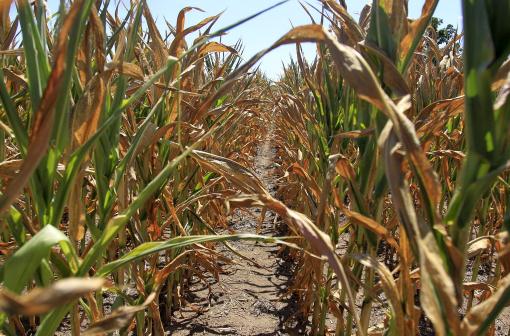
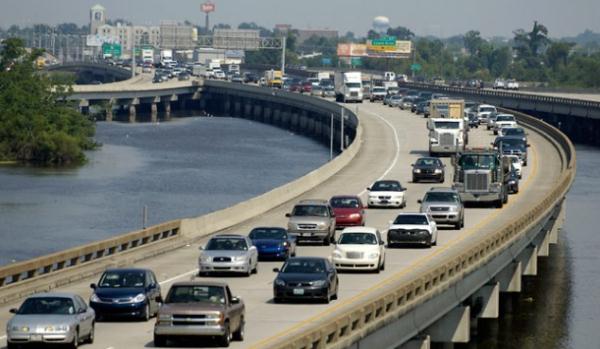
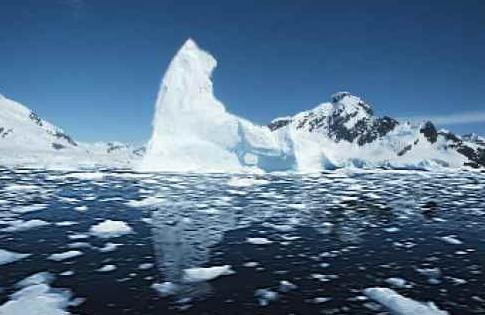
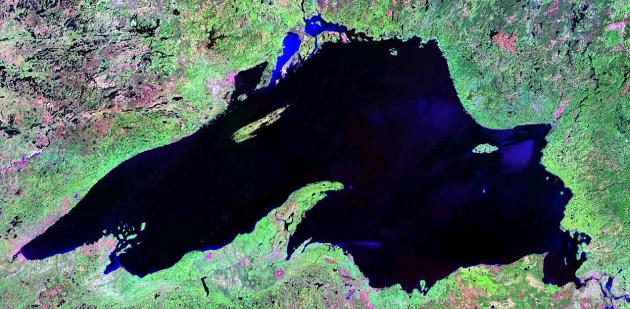
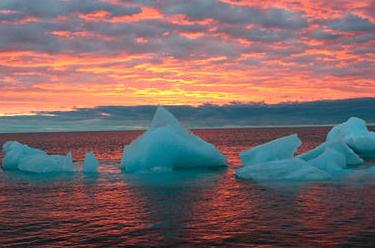
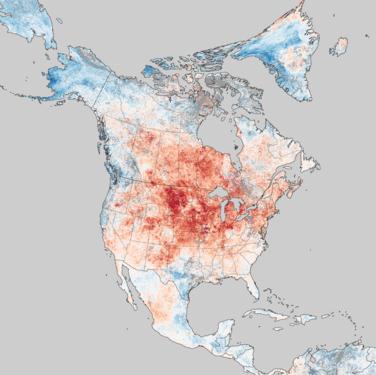
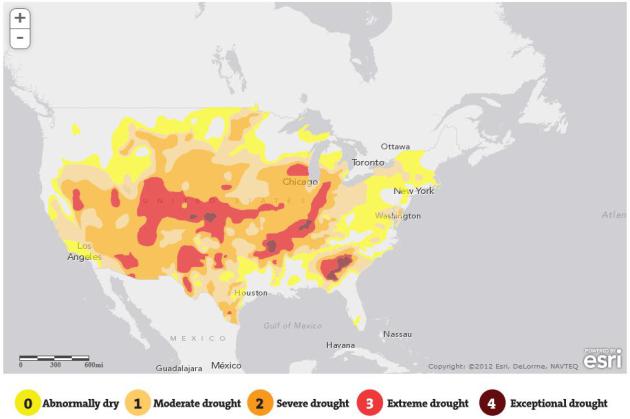
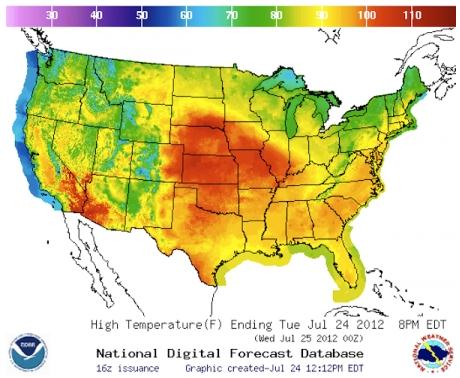
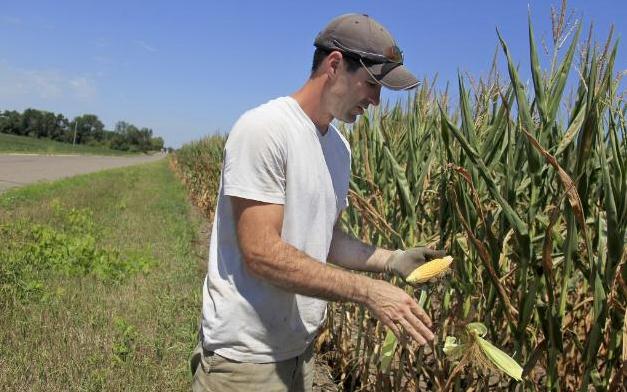
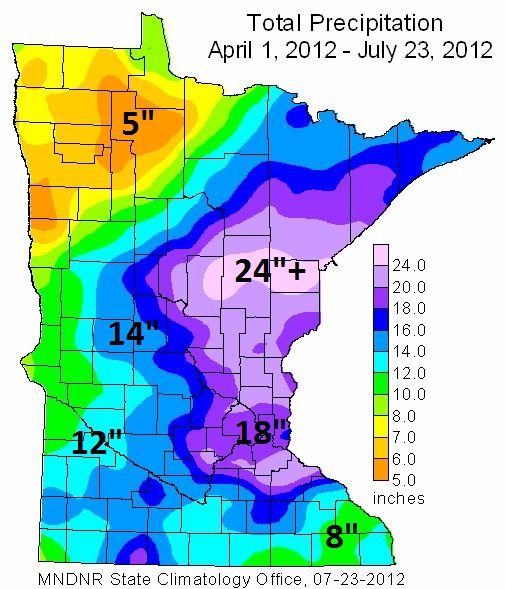
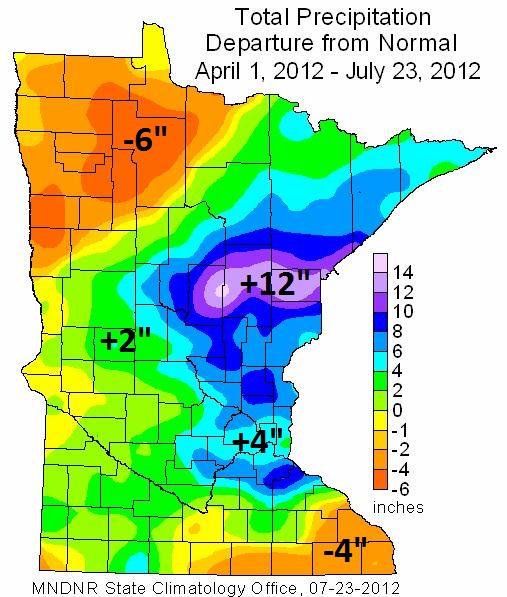

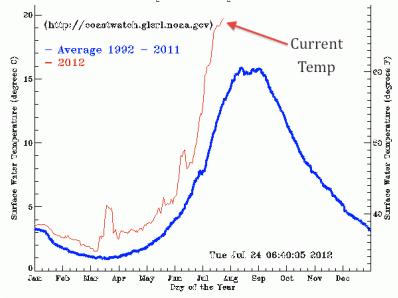
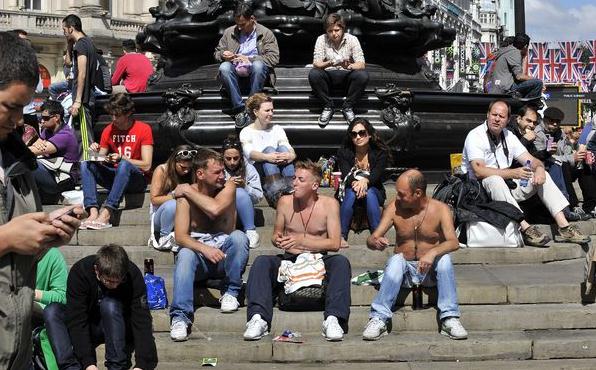
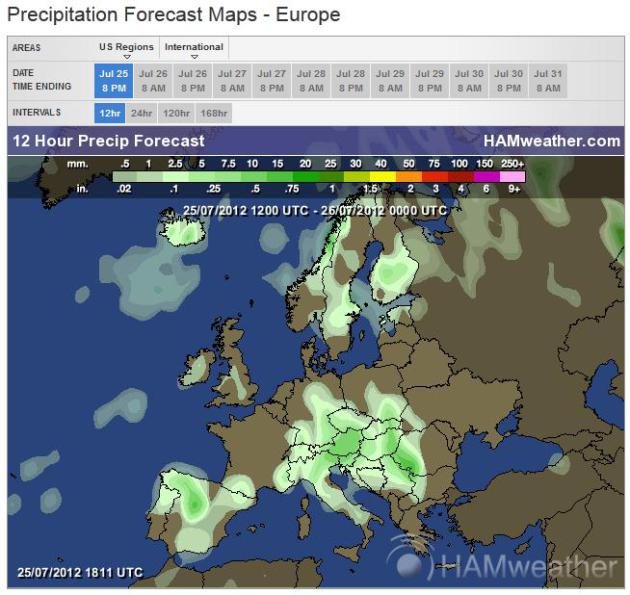
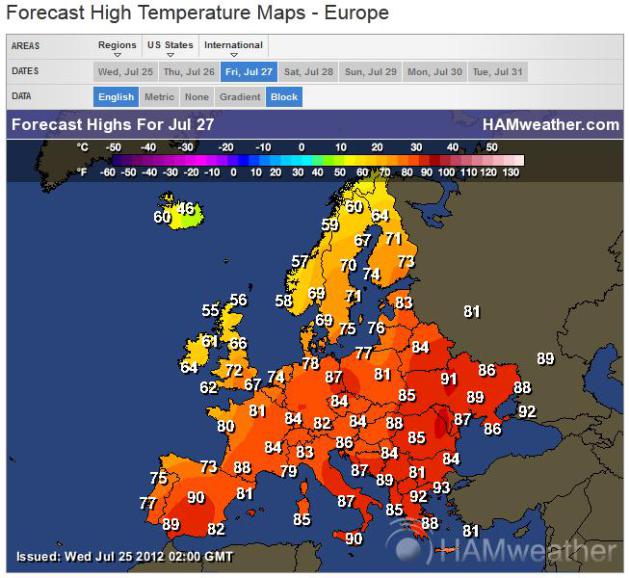


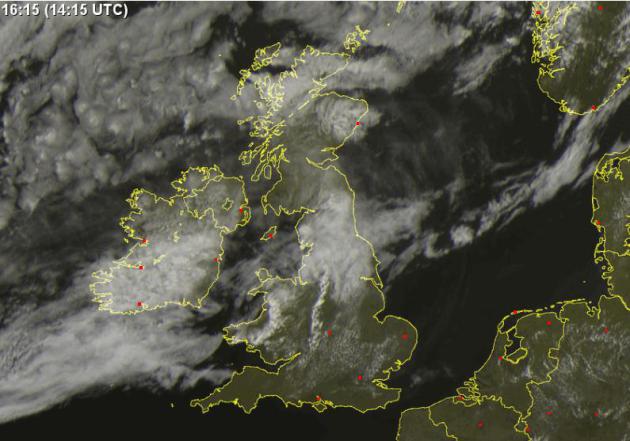
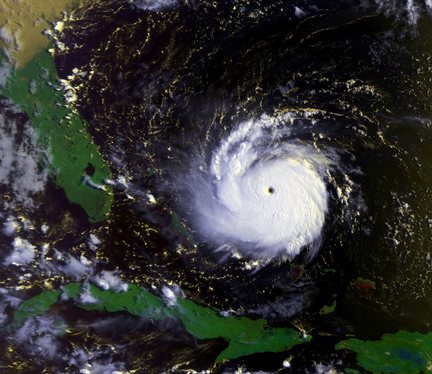


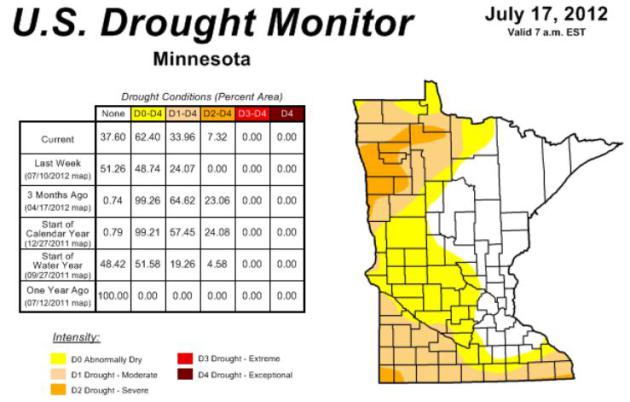
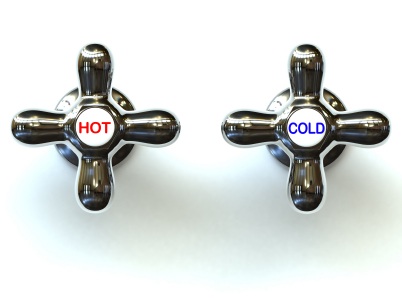



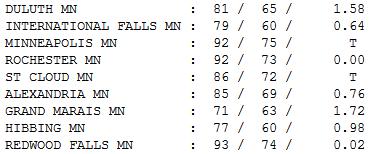
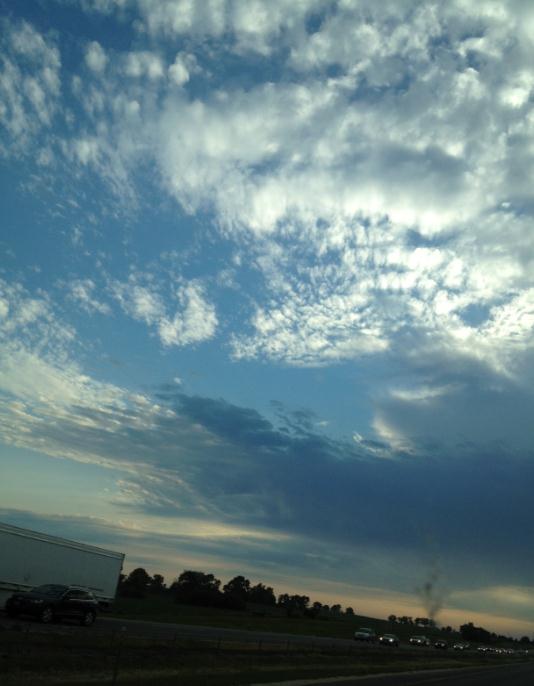
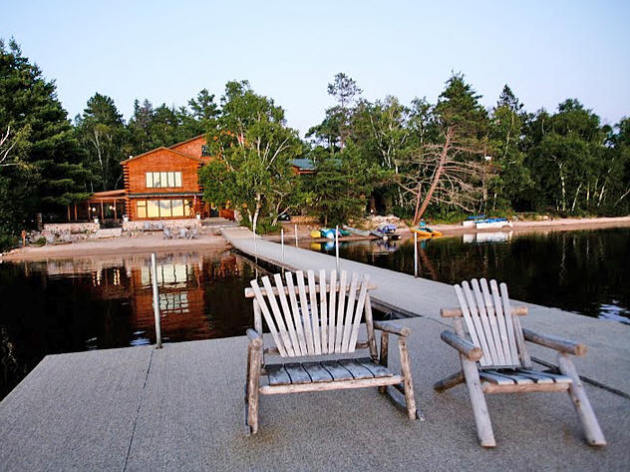
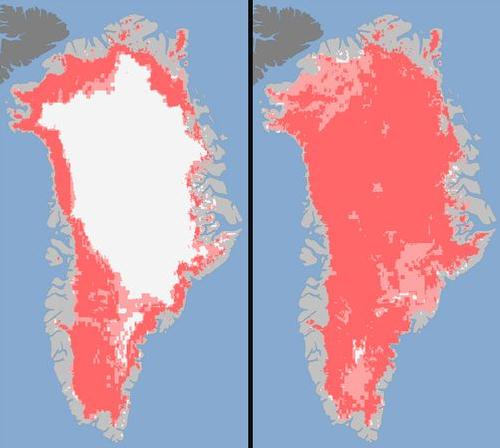
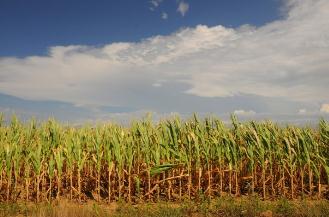
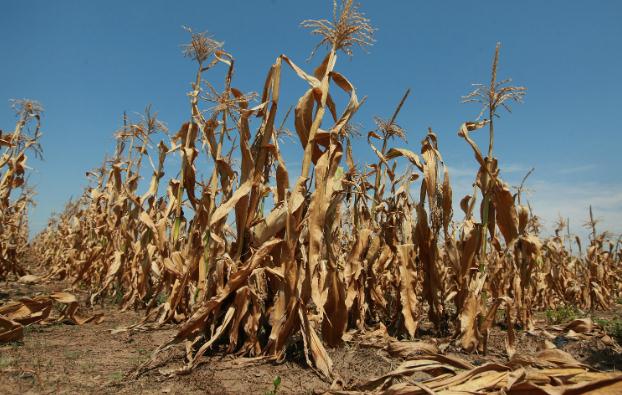

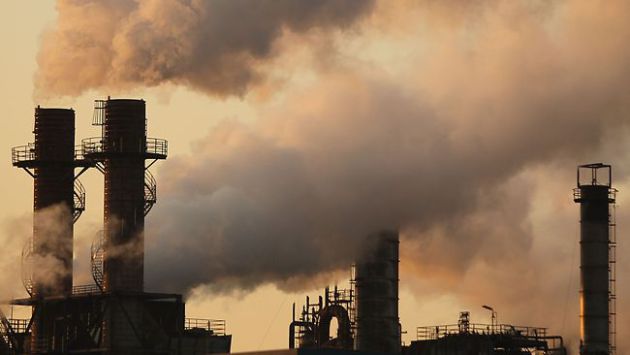


No comments:
Post a Comment